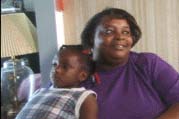LUCASWRITES VIDEOS
Value of A Child
1989
Value of a Child, explores reality based, step by step actions while grounding ourselves in reminders of who we are and who our children are. Once immersed in special ed and therapy systems, we can easily lose sight of both. Value of a Child, a three part series, offers tools and compasses to navigate difficult terrain and smooth the path.
Your guts twirl in a food processor while your internal organs play tennis. In the same moment that professionals in the room are informing your child has a lifelong disability, an avalanche of information plummets towards you. You are expected to make intelligent, thoughtful, informed decisions for your child’s greatest benefit on many levels. Now—not later, after you have had time to process and recover your bearings.
1. Mountains in The Way
How do we regain our footing on what can sometimes feel like a jagged, directionless path to correct diagnosis and evaluation? Because therapies and educational programs are based upon evaluations, we need the evaluations and tests to be well done and appropriate to meet the child’s needs. How do we understand what a good evaluation is? A poorly done one? What do we look for? How does it apply to our child? Have the areas of need been appropriately identified? Have the strengths and gifts been identified?
2. Knowledge is Power
Support, support, support. Surgeons do not go into operating rooms without training, and you do not go in to an IEP meeting without understanding what an IEP is and the impact and power it holds over your child, for worse or for better. Basic information will empower you—question the evaluations, take time to consider and understand them; know your rights—to receive testing information ahead of time, and to take a few days to understand the IEP before you sign it. Is the child being pushed further into this disability, or were the strengths of your child used to bridge the areas of need? Lots of good information provided by professionals will make the journey much smoother and more beneficial for you, your family harmony, and your child.
3. Getting There from Here
Access, access, access. Practical step by step progress. What are the best therapies which will benefit your child? Are they available, where and how often? Do you experience more stress and anxiety in your child, or do you see growth and benefit? How can you tell what hurts and what works?
All of Us
1991
"... frank, well-done discussions about male and female reproductive organs, contraceptive devices and other relevant topics . . . an informative program . . . "
- James Scholtz, Booklist

All of Us Talking Together: Sex Education for People with Developmental Disabilities
Let’s keep our children and adults safe and informed by presenting vital, life saving strategies for parents to offer to people with developmental disabilities.
All of Us Talking Together: Sex Education for People with Developmental Disabilities
Parents and caregivers of young people with developmental disabilities often feel isolated and unsure when approaching sex education with their children. Discomfort is magnified by lack of teaching tools. Parental and caregiver silence can often have tragic consequences for people with developmental disabilities, both legal and personal.

We present:
Straight from the heart:
Parents and their own children with developmental disabilities talk to each other. Young people with special needs tell us about their desires and hopes for companionship, relationships, loneliness, thoughts, wishes fears and concerns about their futures.
HIV/Aids protection—Parents Tell Your Children:
Rick, a 29 year old former nurse, poignantly shares dramatic changes in his life since becoming infected with AIDS. Young mother Crystal describes her hopes, hopes and challenges living as HIV positive –and the conversations she needs to have with her five year old daughter.
Sex Education:
Professional educators speaking directly to young people with developmental disabilities describe both the physical and social arenas of sex education and why topics vary by age. The conversations begin, one step at a time.

Our Goals:
⋅ Self-empower, protect and inform this vulnerable population.
⋅ Provide parents and caregivers with practical, comfortable skills, tools and models to communicate crucial information about sex education.
⋅ Encourage beneficial, assertive behavior, informed and willing choices based on awareness of dignity and self-worth.
⋅ Protect against STD’s AIDS/HIV.
⋅ Understand public versus private.
⋅ Recognize and report sexual harassment and abuse.






Sponsored by
Tri-Counties Regional Center
additional funding provided by Santa Barbara County Health AIDS Task Force
New Worlds
1992
Computers give voice—loud and strong--to the voiceless.
When is the last time a computer was impatient with your child, made critical comments, or raised a questioning eyebrow in his direction?
Computers are patient, do not criticize, intimidate or bully. New Worlds describes the value of computers—therapeutic and educational -- to people with special needs. Two young students show us how much computers have influenced their experience and how computers have transformed their lives.
for more information, contact Irene Semer Lucas, Producer